11 December 2018
All-Ireland vote for the Irish Republic
Centenary of the 1918 General Election
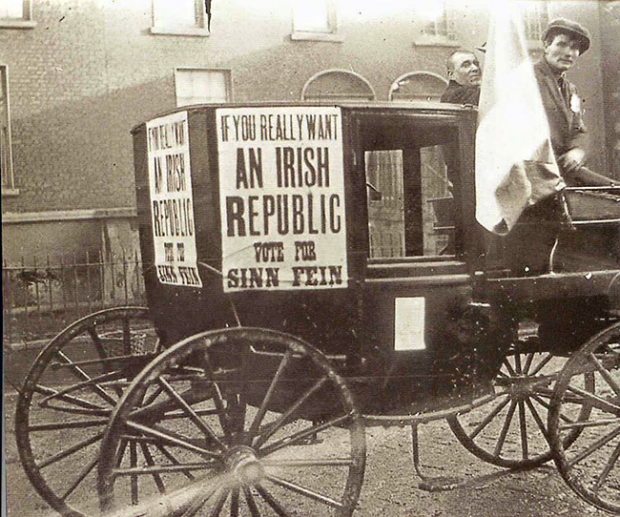
The first truly democratic election held in Ireland was the General Election of December 1918. Seismic political events, including the Home Rule crisis, the World War, the 1916 Rising and the Conscription threat had shaken the country since the last General Election in 1910. Women had the vote for the first time, other restrictions on the universal right to vote had been removed and the widening of democracy helped to ensure a stunning victory for Sinn Féin on a Republican platform.
Ireland elected 105 members to the House of Commons in the Westminster Parliament. They were elected in single-seat constituencies on the first-past-the-post voting system, as Westminster MPs are elected to this day. Since its foundation in 1905 Sinn Féin had advocated the withdrawal of Irish MPs from Westminster and the establishment of an Irish constituent assembly. It was only in 1917, in successive by-election victories, that Sinn Fein won Westminster seats and put its abstentionist policy into operation. The swing to Sinn Féin was not only because of the executions and mass imprisonments after the 1916 Rising; there was also growing opposition to Ireland's involvement in the war and its cost in lives, the inclusion in the British Cabinet of Tory Unionists who vehemently opposed any form of Home Rule, the threat of Partition and the ineffectiveness of the Irish Party at Westminster, led by John Redmond, increasingly seen as collaborators with British imperialism, as well as ongoing repression and press censorship.
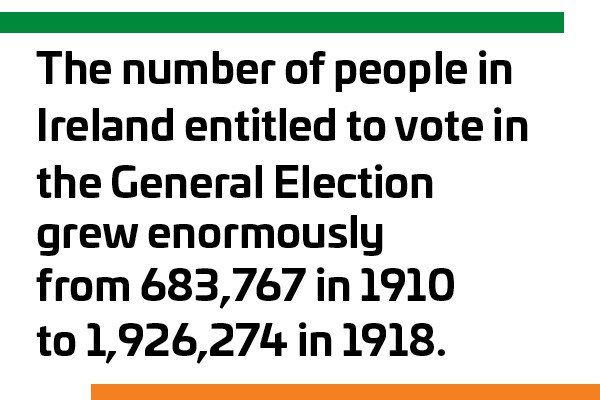
Redmond died in March 1918 and in April the British government introduced legislation to impose Conscription in Ireland. The Irish Party MPs withdrew from Westminster in protest, thus ending forever any significant Irish nationalist presence in that Parliament. Sinn Féin, the Irish Volunteers and the trade union movement took the lead in the anti-Conscription campaign. The Irish Party was also involved and it had three by-election successes in 1918 but the writing was on the wall. In East Cavan in June Sinn Féin's Arthur Griffith won a decisive victory on the abstentionist platform which Irish Party leader John Dillon had called 'a policy of lunatics'. It was widely predicted that Dillon's party faced heavy defeat whenever the General Election came.
Well before the war ended, Sinn Féin's election preparations were under way. The jailing of many of its leaders in the British government's concocted German Plot did not deter the movement. In August 1918 General Secretaries Harry Boland and Tom Kelly reported to the Ard Chomhairle that there were over 1,600 cumainn throughout the country. The same meeting endorsed a motion to contest every seat in the General Election “in order to give every Irish voter the opportunity of voting for or against the establishment of an independent Irish Republic”.
By the time of the Sinn Féin Ard Fheis in October 1918, many candidates had already been selected, a process overseen by Harry Boland, based at the movement’s Head Office in 6 Harcourt Street, Dublin. That same month the electoral register was revised to take account of the widened franchise. Women over 30 could vote for the first time and remaining property qualifications for men over 21 were removed. This meant that the number of people in Ireland entitled to vote in the General Election grew enormously from 683,767 in 1910 to 1,926,274 in 1918.
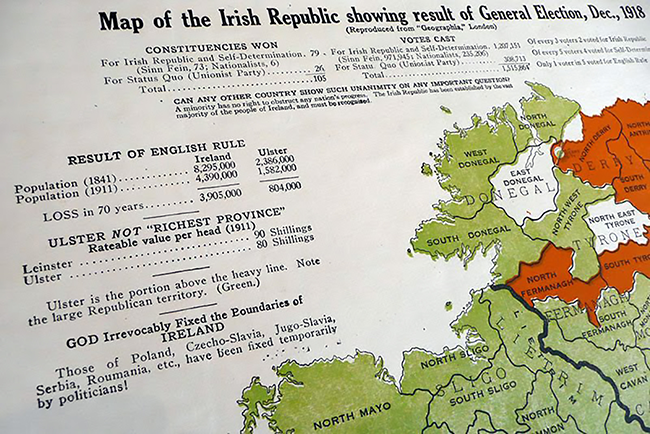
On 16 October the Irish Labour Party and Trade Union Congress announced its intention to stand in a number of constituencies. But there was opposition both internally and externally. Sinn Féin requested that Labour candidates take a pledge to abstain totally from Westminster, in which case Sinn Féin would stand aside in selected seats. But the Labour position was to abstain conditionally, retaining the option to attend in certain circumstances. A great many trade unionists were members or supporters of Sinn Féin and opposed Labour standing unless the full pledge was taken. A special conference of the Irish Labour Party and Trade Union Congress was held in the Mansion House on 1 and 2 November, at which the decision was taken not to stand in the General Election. Debate has continued ever since about the reasons for this decision and its consequences. There was a wide variety of views within the Irish trade union movement ranging from socialist republicans to Home Rulers to Unionists, so the reasons for non-participation were varied. Historian Dorothy Macardle put it this way:
"The majority of the working men and women of Ireland were members of Sinn Féin or the Volunteers or Cumann na mBan, and, as the disciples of James Connolly, held that the freedom of the nation and the freedom of the working classes must be pursued as one undivided aim." (‘The Irish Republic’).
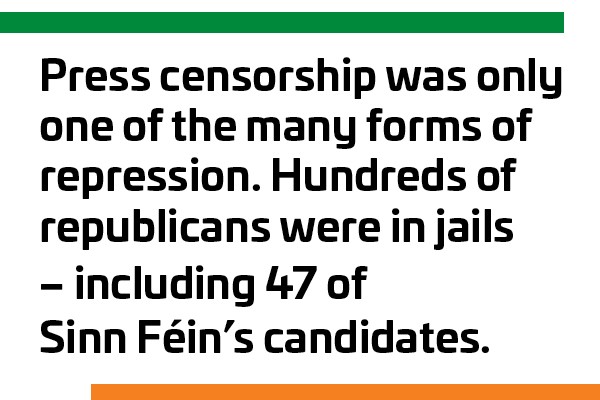
The war ended on 11 November and the British Parliament was dissolved on 25 November. Polling days was set for 14 December.
The Sinn Féin manifesto reflected the republican position adopted by the Ard Fheis a year previously and stated that the party "gives Ireland the opportunity of vindicating her honour and pursuing with renewed confidence the path of national salvation by rallying to the flag of the Irish Republic". It was committed to establishing the Irish Republic by withdrawing Irish representation from Westminster, using “any and every means available” to make British rule impossible, establishing a constituent assembly and appealing to the post-war Peace Conference to recognise Ireland as an independent nation. It roundly condemned the role of the Irish Party in collaborating with the British government and attempting to “harness the Irish people to England’s war chariot”. The Manifesto endorsed the 1916 Proclamation “guaranteeing within the independent Nation equal rights and equal opportunities to all its citizens”. The manifesto was censored by the British authorities when it appeared in the newspapers but the full version was widely circulated.
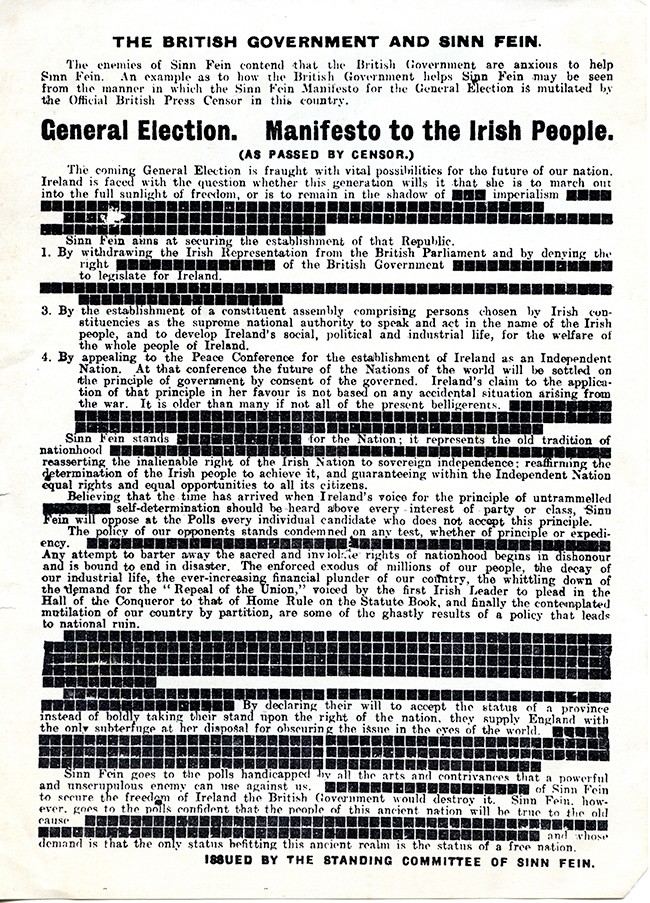
Press censorship was only one of the many forms of repression that the British used during the election. Hundreds of republicans were in jails – including 47 of Sinn Féin.s candidates. Raids and arrests were frequent, as were bans on public meetings and among those arrested during the campaign was Sinn Féin Director of Elections Robert Brennan. His two predecessors, Seán Milroy and Dan McCarthy, were already in prison. British soldiers and loyalists had attacked 6 Harcourt Street on 11 November and subsequent nights, leading to the death from a stroke of ‘Nationality’ editor Seumas O’Kelly. On 20 November the office was raided by a large force of armed Dublin Metropolitan Police who arrested Brennan and seized manifestos and other election material. Acting Director of Elections James O’Mara wrote to the press: “Each arrest has naturally caused some disorganisation, but the cause of Irish independence will not be stayed or broken by such tyranny. Men have been, and will be, found who will fill the vacant places.”
Nominations were due to close on 4 December. In North-East Ulster the Catholic bishops suggested that Sinn Féin and the Irish Party should not split the nationalist vote in seats where this would allow a Unionist to win. Sinn Féin proposed that a plebiscite be held among nationalist voters in these constituencies. Dillon rejected this in talks with Sinn Féin representative Eoin Mac Néill. The latter acceded to a call for the Catholic Cardinal Logue to propose a four-four division of eight seats between the two parties. Others in Sinn Féin criticised Mac Néill for not adhering to his instructions. Sinn Féin candidates remained in the race in three of the four Irish Party-allocated constituencies but did not campaign and their voters were urged to support the Irish Party to keep the Unionists out. In taking this position the need to oppose the British threat of Partition was very much to the fore.
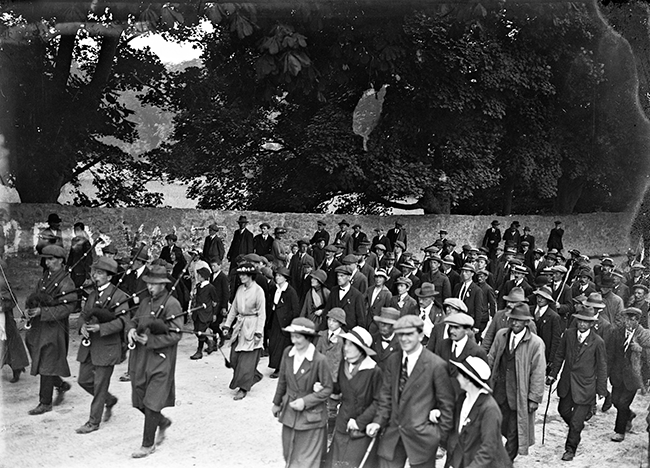
• REBEL COUNTESS: Constance Markievicz with Sinn Féin supporters in Kilkenny during the 1918 general election
When nominations closed it was realised that 36 outgoing Irish Party MPs were not contesting the election and in 25 constituencies, 17 of them in Munster, the Sinn Féin candidates were unopposed. Sinn Féin contested 103 of the 105 constituencies (the exceptions were Trinity College Dublin and North Down).
Harassment continued right up to polling day with raids and arrests, seizure of Sinn Féin election material and removal of posters by British crown forces. After the death in Usk Prison, Wales, on 9 December of republican prisoner Richard Coleman, Sinn Féin campaigners wore black crepe on candidate badges. In 'The Four Glorious Years' Frank Gallagher says a final election rally filled Dublin's O'Connell Street with speakers on several platforms, each flying a Tricolour with a black cross for Richard Coleman. He describes how on polling day Dublin dockers marched to the polling station behind an advance guard of Citizen Army veterans and hundreds of workers at the new British aerodrome at Collinstown – now Dublin Airport – went to the polls in a fleet of lorries flying Tricolours.
The only two women candidates were both suffragists and 1916 Rising veterans - Countess Markeivicz in the St Patrick’s Ward in Dublin’s South Inner City and Winifred Carney in the strongly Unionist Victoria ward in Belfast. Markievicz was in Holloway Prison in England and her election address to her constituents she said:
“I have many friends in the constituency who will work all the harder for me. They know that I stand for the Irish Republic, to establish which our heroes died, and that my colleagues are firm in the belief that the freeing of Ireland is in the hands of the Irish people today.”
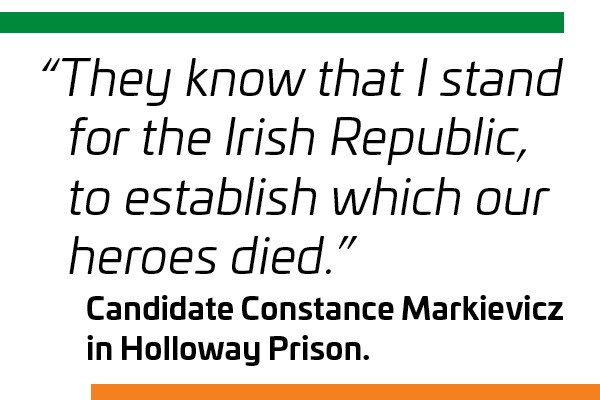
There was a two-week gap between polling day and the announcement of the final results on 28 December. Sinn Féin had won an overwhelming victory, taking 73 of the 105 seats in Ireland. Unionists won 26 and the Irish Parliamentary Party six (down from 80). The majority vote for Sinn Féin was 70 per cent: 24 of the 32 Counties returned only Sinn Féin TDs. Of Dublin's 11 TDs, all but one were Sinn Féin. The myth of nine-county Ulster being Unionist was exposed. Unionists polled a majority in Antrim, Armagh, Derry and Down but there were nationalist majorities in Cavan, Donegal, Fermanagh, Monaghan and Tyrone.
Constance Markievicz was the only woman elected in Ireland and Britain and would go on to be one of the first women government ministers in the world in the First Dáil Éireann. Preparations for that Dáil, the democratic assembly of the Irish Republic so strongly mandated by the electorate, began soon after the General Election that transformed Ireland 100 years ago.
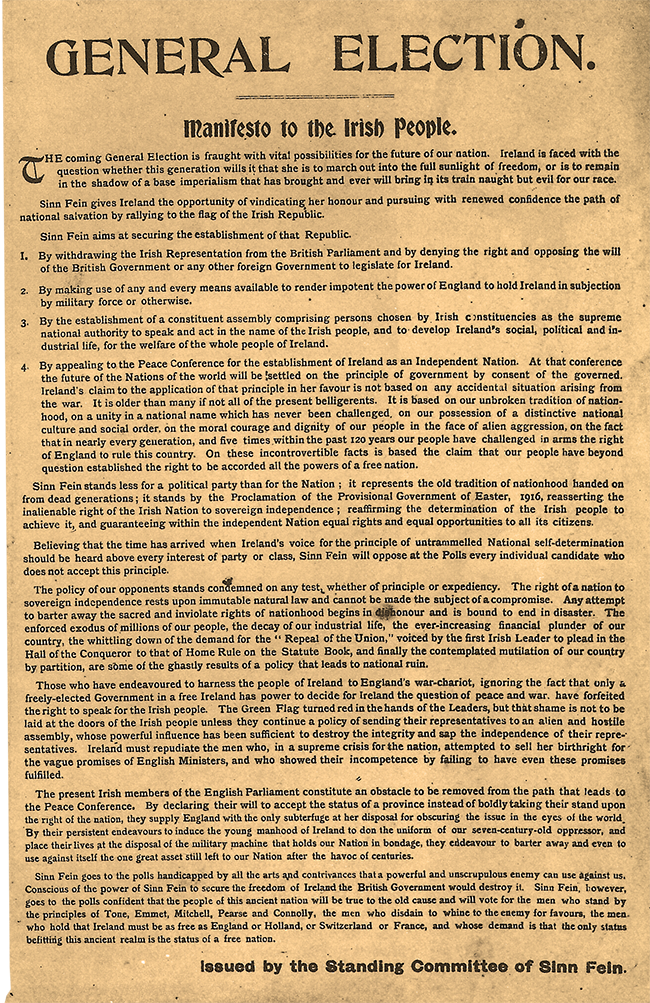
GENERAL ELECTION - MANIFESTO TO THE IRISH PEOPLE
THE coming General Election is fraught with vital possibilities for the future of our nation. Ireland is faced with the question whether this generation wills it that she is to march out into the full sunlight of freedom, or is to remain in the shadow of a base imperialism that has brought and ever will bring in its train naught but evil for our race.
Sinn Féin gives Ireland the opportunity of vindicating her honour and pursuing with renewed confidence the path of national salvation by rallying to the flag of the Irish Republic.
Sinn Féin aims at securing the establishment of that Republic.
1. By withdrawing the Irish Representation from the British Parliament and by denying the right and opposing the will of the British Government or any other foreign Government to legislate for Ireland.
2. By making use of any and every means available to render impotent the power of England to hold Ireland in subjection by military force or otherwise.
3. By the establishment of a constituent assembly comprising persons chosen by Irish constituencies as the supreme national authority to speak and act in the name of the Irish people, and to develop Ireland's social, political and industrial life, for the welfare of the whole people of Ireland.
4. By appealing to the Peace Conference for the establishment of Ireland as an Independent Nation. At that conference the future of the Nations of the world will be settled on the principle of government by consent of the governed. Ireland's claim to the application of that principle in her favour is not based on any accidental situation arising from the war. It is older than many if not all of the present belligerents. It is based on our unbroken tradition of nationhood, on a unity in a national name which has never been challenged, on our possession of a distinctive national culture and social order, on the moral courage and dignity of our people in the face of alien aggression, on the fact that in nearly every generation, and five times within the past 120 years our people have challenged in arms the right of England to rule this country. On these incontrovertible facts is based the claim that our people have beyond question established the right to be accorded all the power of a free nation.
Sinn Féin stands less for a political party than for the Nation; it represents the old tradition of nationhood handed on from dead generations; it stands by the Proclamation of the Provisional Government of Easter, 1916, reasserting the inalienable right of the Irish Nation to sovereign independence, reaffirming the determination of the Irish people to achieve it, and guaranteeing within the independent Nation equal rights and equal opportunities to all its citizens.
Believing that the time has arrived when Ireland's voice for the principle of untrammelled National self-determination should be heard above every interest of party or class, Sinn Féin will oppose at the Polls every individual candidate who does not accept this principle.
The policy of our opponents stands condemned on any test, whether of principle or expediency. The right of a nation to sovereign independence rests upon immutable natural law and cannot be made the subject of a compromise. Any attempt to barter away the sacred and inviolate rights of nationhood begins in dishonour and is bound to end in disaster. The enforced exodus of millions of our people, the decay of our industrial life, the ever-increasing financial plunder of our country, the whittling down of the demand for the 'Repeal of the Union,' voiced by the first Irish Leader to plead in the Hall of the Conqueror to that of Home Rule on the Statute Book, and finally the contemplated mutilation of our country by partition, are some of the ghastly results of a policy that leads to national ruin.
Those who have endeavoured to harness the people of Ireland to England's war-chariot, ignoring the fact that only a freely-elected Government in a free Ireland has power to decide for Ireland the question of peace and war, have forfeited the right to speak for the Irish people. The green flag turned red in the hands of the Leaders, but that shame is not to be laid at the doors of the Irish people unless they continue a policy of sending their representatives to an alien and hostile assembly, whose powerful influence has been sufficient to destroy the integrity and sap the independence of their representatives. Ireland must repudiate the men who, in a supreme crisis for the nation, attempted to sell her birthright for the vague promises of English Ministers, and who showed their incompetence by failing to have even these promises fulfilled.
The present Irish members of the English Parliament constitute an obstacle to be removed from the path that leads to the Peace Conference. By declaring their will to accept the status of a province instead of boldly taking their stand upon the right of the nation they supply England with the only subterfuge at her disposal for obscuring the issue in the eyes of the world. By their persistent endeavours to induce the young manhood of Ireland to don the uniform of our seven-century old oppressor, and place their lives at the disposal of the military machine that holds our Nation in bondage, they endeavour to barter away and even to use against itself the one great asset still left to our Nation after the havoc of the centuries.
Sinn Féin goes to the polls handicapped by all the arts and contrivances that a powerful and unscrupulous enemy can use against us. Conscious of the power of Sinn Féin to secure the freedom of Ireland the British Government would destroy it. Sinn Féin, however, goes to the polls confident that the people of this ancient nation will be true to the old cause and will vote for the men who stand by the principles of Tone, Emmet, Mitchel, Pearse and Connolly, the men who disdain to whine to the enemy for favours, the men who hold that Ireland must be as free as England or Holland, Switzerland or France, and whose demand is that the only status befitting this ancient realm is the status of a free nation.
ISSUED BY THE STANDING COMMITTEE OF SINN FÉIN
Follow us on Facebook
An Phoblacht on Twitter
Uncomfortable Conversations

An initiative for dialogue
for reconciliation
— — — — — — —
Contributions from key figures in the churches, academia and wider civic society as well as senior republican figures





